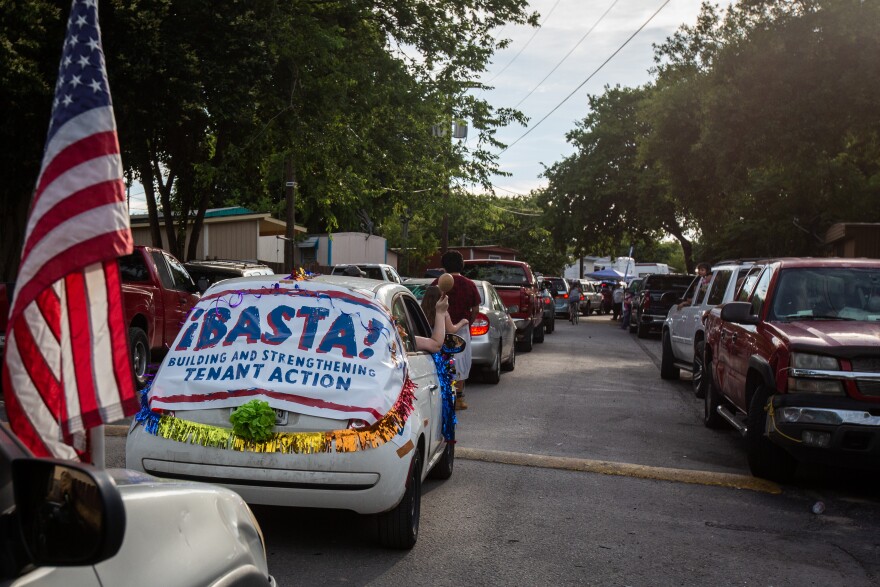Drivers honked their horns in celebration as they paraded through a mobile home park in North Austin on Saturday evening. The drivers, the majority of whom live in the neighborhood, had written Spanish words and phrases on their windows: “Felicidades,” “Sí se pudo” and “Es tu comunidad.”
Congratulations. Yes, we could. It’s your community.
Residents of North Lamar Mobile Home Park were celebrating — as best they could during a pandemic — a deal finalized Friday to buy the land their homes sit on from owners who once threatened to raise rent and evict them if they couldn’t pay.
With a mixture of money from various lenders, including the City of Austin and a national organization for cooperative housing, residents agreed to a $7.15 million loan in order to buy the 69-lot community from two prominent mobile home investors, Frank Rolfe and Dave Reynolds. Nearly all the residents are low-income, making less than $60,000 a year for a family of four.

“I am so happy to be a part of this community,” Roberto Sanchez, who has lived at the property for 20 years, said in Spanish through tears over a bullhorn on Saturday after he finished leading the parade of cars.
Sanchez said the fight had been long, a culmination of roughly five years of work with organizers and lawyers.
Rolfe said he was glad the purchase was done.
“Now it’s their property. Now they can raise the rent, they can deal with the capital,” he said Sunday. “We do congratulate them on buying it.”
In 2015, residents said that quickly after buying the community, the owners began raising rents and utility fees, threatening to evict tenants who could not pay. Rolfe told KUT the park was in such bad shape that rent raises were needed to make repairs. Residents began organizing with City Council Member Greg Casar’s office and Building and Strengthening Tenant Action, or BASTA.
“We started this struggle because of the way they treated us renters,” Sanchez, who serves as the president of the board of residents, Asociación de Residentes de North Lamar, said in a press release. “We were being stepped on because we are a low-income community and they thought we would not fight back. … That’s why we organized.”

In coming together to buy their mobile home park, residents were confronting a sector of housing that’s increasingly being controlled by large investors.
Rolfe and Reynolds offer classes on how to invest in mobile home parks through their organization Mobile Home University, which advertises an opportunity to “learn to buy, operate, turnaround & sell mobile home parks.” In 2017, the organization reportedly held one of its classes in downtown Austin and some residents of the North Lamar Mobile Home Park showed up to protest.
When the mobile home park went on the market in December, residents began putting together a budget and applying for loans, including the one from the City of Austin. Once the pandemic started, residents and organizers met via Zoom and had to find ways to physically distance while signing documents, some of which required “wet signatures,” meaning residents could not sign them virtually.
Organizers said in a statement they hope the North Lamar community inspires other residents of mobile home parks in Austin.
“Hopefully, this sale sparks a larger movement,” Shoshana Krieger, project director of BASTA, said in a statement.

Over the past decade, several mobile home parks in Austin have been redeveloped, pushing some mobile home owners outside the city. As a result, the city has lost several affordable housing options; a 2014 study by the Consumer Financial Protection Bureau calculated that urban renters living in mobile homes pay roughly $300 less in monthly rent than tenants living in homes or apartments built on-site.
“You all are the most important thing we have in this community, in the City of Austin,” Casar told residents in Spanish on Saturday. “You are working families that care for each other’s children.”
By signing onto the loan to purchase their neighborhood, the residents also agreed to hike their own rent, raising it from $585 to $630 a month. The increase includes money for various infrastructure repairs, including street lighting and drainage. Sanchez called this the end of one fight and the beginning of another.
“We have a lot of projects,” Sanchez said Saturday in Spanish. “In order to carry on, we have to start a new fight.”
Got a tip? Email Audrey McGlinchy at audrey@kut.org. Follow her on Twitter @AKMcGlinchy.
If you found the reporting above valuable, please consider making a donation to support it. Your gift pays for everything you find on KUT.org. Thanks for donating today.





